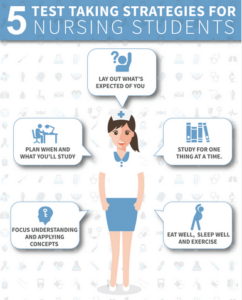80 Nursing Test-Taking Tips and Effective Strategies for NCLEX
 When it comes to nursing exam preparation, there are several strategies that students can employ. According to Walsh (2015), one crucial approach is thorough preparation.
When it comes to nursing exam preparation, there are several strategies that students can employ. According to Walsh (2015), one crucial approach is thorough preparation.
Students often find test preparation time-consuming because they aren’t sure about the test content.
To address this, creating a sufficient preparation timeline is essential. This allows for studying key concepts, attending review sessions, and reading related materials.
Besides, practicing problems and seeking additional help through tutoring contributes to a well-rounded preparation process. Walsh (2015) emphasizes the importance of starting preparation early, as this builds confidence for test day.
The Importance of Early Preparation
Another crucial strategy is self-assessment. Walsh (2015) suggests that students begin self-assessment techniques once the exam date is set. This involves evaluating one’s strengths and weaknesses, using practice tests and rating familiarity with the subject matter. Based on the assessment, students can enroll in refresher courses and allocate time for review, problem-solving, and practice exams. The study also highlights the value of tutoring in addressing challenging areas and boosting confidence for the exam.

Struggling to meet your deadline?
Get your assignment on 80 Nursing Test-Taking Tips and Effective Strategies for NCLEX done by certified MDs and PhDs in the USA. ORDER NOW!
Early preparation holds the key to nursing academic success tips. By investing time and resources, students gain the confidence needed to overcome test-related anxiety (Walsh, 2015). The more thorough the preparation, the more assured students become in tackling the exam.
Understanding Test Instructions
Understanding instructions is another essential strategy. Sullivan et al. (2020) note that some students feel overwhelmed when they first read test instructions. To counter this, careful and repeated reading of instructions is advised. This practice helps in comprehension and reducing anxiety. Students often worry about the test content, not knowing what to expect (Sullivan et al., 2020). A thorough reading of the test, therefore, is beneficial.
Before answering any questions, students should ensure they fully comprehend the requirements. According to Sullivan et al. (2020), some students rush through questions and later realize they missed important requirements. Reading questions slowly and attentively helps students identify all the necessary elements. This way, students avoid assuming what the question asks and missing important instructions.
Test Anxiety Management for Nurses
In addition to preparation and understanding instructions, managing test anxiety is crucial for nursing students. By employing effective study habits and time management techniques, students can create a study schedule that allows for breaks and self-care. This balance is vital for maintaining focus and reducing stress levels leading up to the exam.
80 Nursing Test-Taking Tips and Effective Strategies for NCLEX
Question Analysis and Understanding
- Read Each Question Carefully: Take your time to carefully read and understand each question. Identify key terms and ensure you know exactly what is being asked. Misreading can lead to incorrect answers.
- Rephrase the Question: Put the question in your own words. This can simplify things and help you focus on what is required.
- Identify Keywords: Look for important words in both the question and the answers. Words like “first,” “best,” or “most critical” often point to the right answer.
- Watch for Grammar Issues: Eliminate answers that don’t fit grammatically with the question. The correct choice should align with the question’s structure.
- Recognize Associated Words: Answers with words related to the question stem might hint at the right choice.
- Assume Ideal Conditions: Imagine you’re in a fully-equipped healthcare setting with all the necessary resources—this will help you focus on the best possible care.
- Return to Basics: If a question stumps you, think back to your basic nursing knowledge. Apply what you know, even if the question seems unfamiliar.
- Be Cautious with Absolutes: Be wary of answers using absolute terms like “always” or “never.” In nursing, few situations are absolute.
- Focus on Patient Needs: Prioritize the patient’s immediate needs. The best answers often revolve around delivering effective, compassionate care.
Test-Taking Strategies
- Trust Your Instincts: If you have a strong feeling about an answer, go with it. Your first choice is often the right one unless you find a compelling reason to change it.
- Review All Answer Choices: Read each answer carefully before making a choice. Sometimes, the best answer isn’t immediately obvious.
- Practice Select-All-That-Apply (SATA): SATA questions can be tricky. Treat each option as a true/false question to help decide whether it should be selected.
- Understand Scoring: The NCLEX doesn’t penalize you for guessing. It’s better to guess than leave a question blank.
- Prepare for Different Question Types: The NCLEX includes various question formats like multiple-choice, drag-and-drop, and fill-in-the-blank. Practice with all types to build your confidence.
- Time Management: Keep an eye on the clock. Don’t rush, but aim to maintain a steady pace to finish all questions on time.
- Create a Strategy: Develop a plan for how you will tackle the exam. Decide when to move on from difficult questions and when to take a break.
Time Management and Exam Strategy
- Pace Yourself: Don’t spend too much time on one question. Move on and return to tough ones if you have time at the end.
- Double-Check Answers: After selecting an answer, reread it and make sure it directly addresses the question.
- Answer Every Question: Never leave a question blank. If unsure, make an educated guess—blank answers are automatically marked wrong.
- Simulate Exam Conditions: Practice taking full-length tests under timed conditions. This will help you get used to the pressure.
- Logistical Preparation: Know where the exam is, what to bring, and what time to arrive. This will help reduce stress on the big day.

Prioritization and Safety
- Prioritize Patient Safety: The best answers usually focus on keeping the patient safe. Always choose the option that minimizes risk.
- Handle Acute Issues First: Address life-threatening or urgent issues first. Critical problems should be prioritized.
- Don’t Delay Treatment: Choose options that provide immediate treatment. Delaying care can be harmful.
- Group Similar Diagnoses: If you’re placing patients in rooms, group those with similar conditions together to improve care efficiency.
Action and Assessment
- Take Action: NCLEX tests your ability to act in clinical situations. Don’t select answers where nothing happens—active solutions are key.
- Assess Before Acting: Always assess the patient’s condition before starting any intervention.
- Identify the Problem First: Know what the problem is before deciding on the best course of action.
- Report New or Different Conditions: If something new occurs with a patient, report it to the next shift to ensure continuous care.
Decision-Making Strategies
- Eliminate Wrong Answers: Remove answers that are clearly incorrect to increase your chances of selecting the right one.
- Choose the Least Invasive Option: If there are multiple interventions, choose the least invasive one as it’s usually safer.
- Educated Guesses: If unsure, eliminate at least one incorrect answer to improve your odds.
- Use the Process of Elimination: Narrow down your choices by eliminating those that don’t fit with the patient’s symptoms.
- Evaluate Answer Components: For answers with multiple parts, eliminate it if one part is wrong.
- Look for Commonalities: If two answers are very similar, the correct choice is often the one that’s different.
Study Techniques
- Simulate Exam Day: Try a mock test under real exam conditions to help reduce test-day anxiety.
- Get Comfortable with the Computerized Format: The NCLEX is computerized, so practice navigating it to avoid surprises.
- Review Practice Test Results: Look over any mistakes you made in practice tests and understand why you got them wrong.
- Use Visual Aids: Diagrams and charts can help you memorize complex information.
- Create a Study Schedule: Plan your study time to ensure you’re covering all the required content.
- Self-Assessment: Test yourself regularly to gauge your progress and adjust your study plan if needed.
- Learn from Practice Questions: Answering practice questions helps you get familiar with the exam format and improves your test-taking skills.
- Review NCLEX Content Areas: Focus on major areas like safe and effective care, health promotion, and physiological integrity.
- Take Regular Breaks: Avoid burnout by taking breaks to refresh your mind and improve focus.
- Join a Study Group: Collaborating with peers can enhance your understanding and provide different perspectives.
- Use Multiple Resources: Use textbooks, online courses, and other materials to reinforce your learning.
- Focus on Weak Areas: Identify and concentrate on the areas where you’re weakest.
- Stay Informed on NCLEX Changes: Keep up-to-date with any updates to the NCLEX exam format or content.
- Seek Help When Needed: Don’t hesitate to ask for help if you’re struggling with a topic.
- Stay Organized: Keep your materials and study schedule structured to stay on track.
Health and Well-Being
- Stay Hydrated: Drink plenty of water to keep your mind sharp during study sessions and the exam.
- Use Breaks Effectively: Use scheduled breaks during the NCLEX to relax and recharge.
- Take Care of Your Mental Health: Managing stress is essential. Practice relaxation techniques to stay calm.
- Be Kind to Yourself: Recognize your hard work and stay patient with yourself during the preparation process.
- Maintain a Healthy Lifestyle: Eat well, sleep enough, and exercise to support your mental and physical health during your studies.
- Relax After the Exam: After the test, give yourself time to unwind and recharge.
Stress Management and Mental Health
- Stay Calm: Keep your composure during the exam. Take deep breaths if needed.
- Practice Stress Relief: Techniques like meditation or mindfulness can help reduce test anxiety.
- Visualize Success: Imagine yourself succeeding in the exam to boost your confidence.
- Stay Positive: Keep a positive mindset throughout your preparation. Believe in your ability to succeed.
Professional and Peer Support
- Join Online Communities: Connect with other NCLEX test-takers to share tips and experiences.
- Seek Guidance: Professional NCLEX coaches or instructors can offer valuable strategies and support.
- Reward Yourself: Celebrate your study milestones with rewards to stay motivated.
Additional Tips and Strategies
- Stay Updated with Nursing Practices: Make sure you’re up-to-date with current nursing practices, guidelines, and treatments.
- Develop Critical Thinking: The NCLEX is designed to test critical thinking, so engage in exercises that enhance your decision-making skills.
- Review Nursing Theories: Knowing foundational nursing theories can help answer many NCLEX questions.
- Stay Flexible: Be ready to adjust your study plan as needed based on your progress.
- Prepare Logistically for Exam Day: Know what to expect at the testing center to reduce anxiety.

Post-Exam Reflection and Next Steps
- Reflect on Your Performance: After the exam, take time to think about what went well and what can be improved.
- Plan Your Next Steps: Whether you pass or need to retake the exam, identify areas for improvement and adjust your study plan accordingly.
- Celebrate Your Efforts: Regardless of the outcome, acknowledge your hard work and dedication.
- Seek Feedback: If needed, get feedback from instructors or mentors to improve your preparation for the next attempt.
- Stay Positive: Keep a positive attitude, stay persistent, and continue striving toward success.
These tips are designed to help your nursing exams including NCLEX! By focusing on effective study techniques, test-taking strategies, and mental well-being, you can boost your chances of passing with flying colors. If you need more help with your online nursing papers, nursing assignments, or nursing research, feel free to check out our resources for the best nursing papers and top nursing essays!
Conclusion
In conclusion, effective nursing test-taking strategies encompass comprehensive preparation, self-assessment, understanding instructions, and careful consideration of question requirements. By integrating NCLEX preparation strategies, practicing with practice tests for nursing exams, and developing effective study techniques, students can enhance their confidence, mitigate anxiety, and lead to better test outcomes.
References
Sullivan, B., Dunn, K., & Berry, V. (2020). Test preparation: An international comparison of test takers’ preferences. Assessment in Education: Principles, Policy & Practice, 28(1), 13-36.
Walsh, K. (2015). How to pass exams: evidence-based advice?. Journal of the Royal Society of Medicine, 98(6), 294-294.

Dont wait until the last minute.
Provide your requirements and let our native nursing writers deliver your assignments ASAP.

